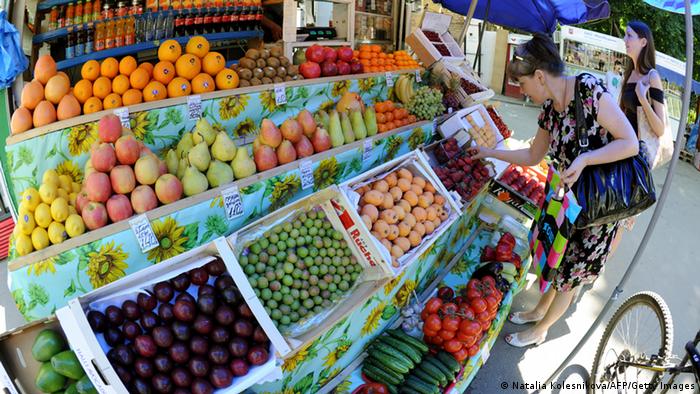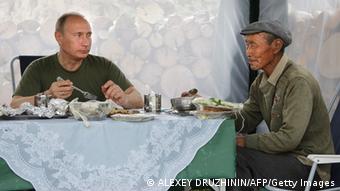Russia retaliates with a ban on Western food
Responding to EU economic sanctions, Russia has banned food imports from the West. The ban comes at a bad time for the struggling eurozone economy, and some have called for government compensation.
Responding to Russia's retaliation on Thursday (07.08.2014), the European Commission was self-assured and relaxed. The European Union, a spokesman said, is "prepared to act" regarding the Russian import ban on food from EU member states.
"We reserve the right to take action as appropriate," said the spokesman, who said the ban was clearly politically motivated. He declined, however, to give details of possible retaliatory measures.
The agriculture and food embargo is set to last a year and includes meat, fish, poultry, milk products, vegetables and fruit from the EU and the US. Australia, Canada and Norway are also affected.
The Kremlin has already shown it can pinpoint specific countries. Immediately after the EU imposed encompassing economic sanctions against Russia on July 31, Moscow stopped the import of fruit and vegetables from Poland, allegedly due to health risks. Poland has always been at the forefront when it comes to taking a hard stance against Moscow.
Russia threatens further steps
Food imports involve large sums of money: According to the Commission, EU food exports to Russia were worth almost 12 billion euros ($16 billion) in 2013. For the most part, this trade will now likely cease to exist. Local Russian producers are expected to fill the gap, though their efforts are likely to fall short. Imports of Brazilian meat and cheese from New Zealand are expected to fill some of the gaps.
According to German Agriculture Minister Christian Schmidt, the consequences will be noticeable. Udo Hemmerling, deputy secretary general of the German Farmers' Association, told Germany's DPA news agency that "Russia is an important market for our main export foods, mainly meat and milk products."
The food embargo might just be the beginning of Moscow's retaliatory sanctions. Prime Minister Dmitry Medvedev has also threatened that Russia could close its airspace to flights by Western airlines to and from the Asia-Pacific region or restrict the import of cars and planes. That hasn't happened yet, but the existing sanctions and retaliatory measures have already begun to ruin trade for European businesses.
"At the moment we can still take it, but if it goes on Germany's export-oriented industry will also begin to feel it," said Ralph Brinkhaus, conservative deputy parliamentary floor leader, in an interview with German public radio on Thursday.
Europe needs a recovery
The economic climate in the eurozone is depressed and in the view of European Central Bank President Mario Draghi, the Ukraine conflict has only exacerbated the situation. According to the EU Commission, the European economy will lose 40 billion euros this year due to EU economic sanctions against Russia. This includes Russia's retaliatory actions and possible future sanctions by the EU.
A general economic downturn would come at a bad time for the ailing European economy. Europe is laboriously working its way out of years of crisis, not without setbacks: Italy, for example, the EU's fourth largest economy, has now surprisingly slipped back into recession. The weaker EU members, especially Italy, France, Greece and Spain, desperately need a boost. These sanctions will have the opposite effect.
Finland wants compensation
German defense group Rheinmetall was directly affected by the EU sanctions after the German government cancelled the delivery of its combat training equipment to the Russian army, a major contract worth about 100 million euros. As a result, the company has reported a drop in profits and has said it will seek compensation from Berlin.
It has a good chance to get them; with the cancellation of the contract, the German government went beyond the current EU sanctions blocking defense contracts. In general, however, the German Economy Ministry has said it does not plan to support companies which have been threatened with bankruptcy due to the Russian sanctions.
In contrast, the Finnish government this week brought up the idea of possible compensation on an EU level if sanctions against Russia continue.
"It is without doubt clear that, if sanctions hit Finland disproportionately, we will seek support from our European partners," said Finnish Prime Minister Alexander Stubb at a press conference on Wednesday (06.08.2014).
The Finnish economy is heavily dependent on trade with its large neighbor to the east, and has already seen a drop in trade with Russia since the start of the Ukraine conflict. dw de




No comments:
Post a Comment